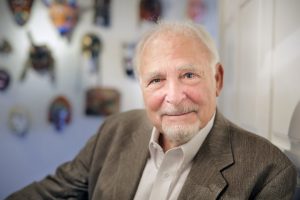Paul Ekman's Top 10 Quotes

Paul Ekman is an American psychologist (Washington, 1934) and an expert in the study of emotions and facial expressions. He’s written more than 14 books and published nearly 200 articles over the course of his career. To get to know him better, we decided to share Paul Ekman’s top 10 quotes!
He’s been a professor at the University of California for more than 30 years. Also, he’s currently considered one of the most prestigious psychologists of the 21st century. In 2009, he was named by TIME magazine as one of the top 100 most influential people in the world.
In addition, he’s been an adviser to the US Department of Defense and the FBI and developed workshops and online interactive training tools with the goal of training people in emotional awareness.
From Darwinian ideas
Paul Ekman’s initial thought was that culture determined emotions. However, as he progressed in his research, his thoughts radically changed.
In this regard, his discoveries made him adopt an evolutionary perspective, close to that of the distinguished English naturalist Charles Darwin. Ekman’s position also favors the fact that emotions are universal and they have a biological, not cultural, origin.
In addition, this scientist contributed to the investigation of the social aspects that determine why and how we lie, which is why he’s currently considered an expert in lie detection.

Paul Ekman’s top 10 quotes that summarize his ideas
Some of his most well-known works include Emotion in the Human Face (1972), Telling Lies: Clues to Detecting Deceit in the Marketplace, Politics and Marriage (1985), Why Kids Lie (1991) or Nonverbal Messages: Cracking the Code (1998).
Many of his findings inspired the hit television series Lie to Me and made him publish the documentary The Human Face for the BBC.
Although there are many quotes that we could highlight from this great psychologist, here are Paul Ekman’s top 10 quotes. They definitely inspire us to reflect.
About lying …
Some of Paul Ekman’s most iconic quotes about lying include:
“Most lies succeed because no one goes through the work to figure out how to catch them.”
“The liar is perfected with practice.”
Consider that lying is a central feature in people. It has an essential role in our lives, and understanding it completely (how people conceal them, how they’re said, how they manifest, or how to detect them) is relevant to almost all human affairs.
“How can you tell when a politician is lying? When he moves his lips!”
“A broken promise is not a lie.”
Ekman is considered the co-discoverer of the facial “micro-expressions.” He demonstrated with Wallace V. Friesen that people can use them to detect lies with a certain degree of reliability.
About emotions …
Some of Paul Ekman’s most iconic quotes about emotions include:
“People also smile when they are miserable.”
“Surprise is the shortest emotion, because we’re only surprised until we know we’re surprised. Surprise always relates to something unexpected.”

In this regard, Ekman considers emotions to be innate. In this way, people from all over the world laugh when they seem to be happy, or open their eyes more when they are surprised.
Therefore, culture takes on the role of dissimulating, exaggerating, concealing or suppressing emotions.
“Smiles are probably the most underrated facial expressions, much more complicated than most people realize. There are dozens of smiles, each differing in appearance and in the message expressed.”
“No important relationship survives if trust is totally lost.”
“People do misinterpret events, especially the meaning of other people’s actions and the motives that lead people to act one way or another.”
“Emotions change how we see the world and how we interpret the actions of others.”
The face: an open book
At first, Ekman believed there were six universal gestures or expressions for six universal emotions: fear, anger, joy, sadness, disgust, and surprise). Later, he expanded the list to 17. He then developed the Facial Action Coding System (FACS) to categorize all the human expressions that we can somehow identify in our faces.
FACS classifies them through the study of facial muscle movements. Think about what a person expresses by lowering their eyebrows, wrinkling their nose, blinking, and raising, bending, or inclining their head. Everything counts.

As you can see, the basis of Paul Ekman’s investigations are the features and states of human beings. For example, his contributions won him the award for Scientific Research of the National Institutes of Mental Health three times.
Currently, the results of his more than 40 years of valuable discoveries apply to a large number of fields, from schizophrenia research to lie detection. He’s an amazing professional.
Paul Ekman is an American psychologist (Washington, 1934) and an expert in the study of emotions and facial expressions. He’s written more than 14 books and published nearly 200 articles over the course of his career. To get to know him better, we decided to share Paul Ekman’s top 10 quotes!
He’s been a professor at the University of California for more than 30 years. Also, he’s currently considered one of the most prestigious psychologists of the 21st century. In 2009, he was named by TIME magazine as one of the top 100 most influential people in the world.
In addition, he’s been an adviser to the US Department of Defense and the FBI and developed workshops and online interactive training tools with the goal of training people in emotional awareness.
From Darwinian ideas
Paul Ekman’s initial thought was that culture determined emotions. However, as he progressed in his research, his thoughts radically changed.
In this regard, his discoveries made him adopt an evolutionary perspective, close to that of the distinguished English naturalist Charles Darwin. Ekman’s position also favors the fact that emotions are universal and they have a biological, not cultural, origin.
In addition, this scientist contributed to the investigation of the social aspects that determine why and how we lie, which is why he’s currently considered an expert in lie detection.

Paul Ekman’s top 10 quotes that summarize his ideas
Some of his most well-known works include Emotion in the Human Face (1972), Telling Lies: Clues to Detecting Deceit in the Marketplace, Politics and Marriage (1985), Why Kids Lie (1991) or Nonverbal Messages: Cracking the Code (1998).
Many of his findings inspired the hit television series Lie to Me and made him publish the documentary The Human Face for the BBC.
Although there are many quotes that we could highlight from this great psychologist, here are Paul Ekman’s top 10 quotes. They definitely inspire us to reflect.
About lying …
Some of Paul Ekman’s most iconic quotes about lying include:
“Most lies succeed because no one goes through the work to figure out how to catch them.”
“The liar is perfected with practice.”
Consider that lying is a central feature in people. It has an essential role in our lives, and understanding it completely (how people conceal them, how they’re said, how they manifest, or how to detect them) is relevant to almost all human affairs.
“How can you tell when a politician is lying? When he moves his lips!”
“A broken promise is not a lie.”
Ekman is considered the co-discoverer of the facial “micro-expressions.” He demonstrated with Wallace V. Friesen that people can use them to detect lies with a certain degree of reliability.
About emotions …
Some of Paul Ekman’s most iconic quotes about emotions include:
“People also smile when they are miserable.”
“Surprise is the shortest emotion, because we’re only surprised until we know we’re surprised. Surprise always relates to something unexpected.”

In this regard, Ekman considers emotions to be innate. In this way, people from all over the world laugh when they seem to be happy, or open their eyes more when they are surprised.
Therefore, culture takes on the role of dissimulating, exaggerating, concealing or suppressing emotions.
“Smiles are probably the most underrated facial expressions, much more complicated than most people realize. There are dozens of smiles, each differing in appearance and in the message expressed.”
“No important relationship survives if trust is totally lost.”
“People do misinterpret events, especially the meaning of other people’s actions and the motives that lead people to act one way or another.”
“Emotions change how we see the world and how we interpret the actions of others.”
The face: an open book
At first, Ekman believed there were six universal gestures or expressions for six universal emotions: fear, anger, joy, sadness, disgust, and surprise). Later, he expanded the list to 17. He then developed the Facial Action Coding System (FACS) to categorize all the human expressions that we can somehow identify in our faces.
FACS classifies them through the study of facial muscle movements. Think about what a person expresses by lowering their eyebrows, wrinkling their nose, blinking, and raising, bending, or inclining their head. Everything counts.

As you can see, the basis of Paul Ekman’s investigations are the features and states of human beings. For example, his contributions won him the award for Scientific Research of the National Institutes of Mental Health three times.
Currently, the results of his more than 40 years of valuable discoveries apply to a large number of fields, from schizophrenia research to lie detection. He’s an amazing professional.
This text is provided for informational purposes only and does not replace consultation with a professional. If in doubt, consult your specialist.







